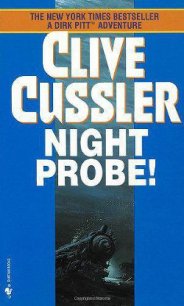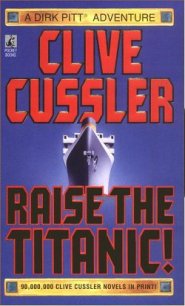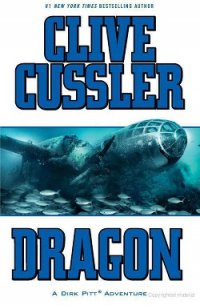Plague Ship - Cussler Clive (полные книги .TXT) 📗
“I think we’re being hailed on the ELF band.”
“Isn’t that what our Navy uses to talk to submarines?”
“Not anymore. The two transmitters they operated were dismantled a couple of years ago. Besides, they transmitted on seventy-six hertz. This is coming in at one hundred and fifteen.”
“What’s the source?” Juan tugged on a pair of pants.
“We haven’t received enough to pinpoint a location, and because of the nature of Extremely Low Frequency transmission we may never know.”
“Okay, you’ve got my interest. I’ll be there in a few minutes.” Juan threw on the rest of his clothes, not bothering with socks, and spent a moment brushing his teeth. According to his watch, he’d been asleep for three hours. It had felt like three minutes.
Entering the Op Center always gave Cabrillo a charge. It was the sleek design, the quiet hum of the computers, and the thought of all the power that could be controlled from this room, not just the Oregon
’s revolutionary engines but also the awesome fire-power the vessel could unleash at a moment’s notice.
Hali had a steaming mug of coffee ready for him.
Cabrillo grunted his thanks and took a sip. “Better,” he said, setting the cup next to Kasim’s monitor.
“Tell me what you’ve got.”
“As you know, the computer automatically scans every frequency in the radio spectrum. When it detected something transmitting at the ELF level, it paused to record the signal, and when it recognized the beginning of the word it alerted me. When I got here, this is what has been sent so far.” He tilted his flat panel so Cabrillo could see what was on the screen: OREGON.
“That’s it?” Juan didn’t try to hide his disappointment.
“ELF waves are incredibly long, upward of twenty-two hundred miles. It’s their length that lets them circle the globe and penetrate deep into the ocean. Basically, an ELF transmitter turns the earth into a giant antenna. The downside is, it takes a long time to send anything, and submarines can’t reply because they can’t carry a transmitter of their own. That’s why the Navy abandoned the whole system. It was just too inefficient.”
“Remind me why a sub can’t carry an ELF system.”
“The antenna alone is roughly thirty miles long. And even though it’s only an eight-watt signal, it would use more electricity than a sub’s reactor has the surplus capacity for. But the biggest reason is, a transmitter has to be located in an area with extremely low ground conductivity in order to avoid the absorption of the radio waves. There are only a handful of places in the world where you can send in the ELF band and a submarine definitely isn’t one of them.
“Going back through the logs,” Hali continued, “I found that there was another ELF transmission on this same frequency at ten o’clock last night. It consisted of only a random jumble of ones and zeros. I have the mainframe trying to crack it, if it is a code, but I’m not optimistic.” The letter I appeared on Hali’s screen, followed sixty seconds later by the letter T.
“This is worse than pulling teeth,” Juan remarked. “Besides us, who else has built ELF antennas?”
“Just the Soviets. Their only use is to contact submarines in deep water and over great distances. There’s no other reason to set one up.”
“So if ours were dismantled, then it has to be the Russians. I wonder if this has something to do with us spying on Kerikov.”
“We’ll know in a minute.” Hali then amended: “Well, ten or fifteen.” And so they waited, as a letter a minute appeared on the computer. So far, they had OREGON ITSMA.
When the next letter came through, Juan stared at it for a second before letting out a triumphant whoop.
It was the letter x.
“What is it?” Hali asked.
"It’s Max. That crafty SOB. He’s found a way to contact us on the ELF band.” Hali suddenly cursed. He opened another window on his computer and retrieved the archive of the wiretap they had installed in Gil Martell’s office. “Why didn’t I see this right away,” he mused aloud, angry at himself. On his screen popped:
I DON’T . . . (1:13) YES . . . (3:57) ’BOUT DAWN AND SKY ... (1:17) (ACT)IVATE THE EEL
LEF . . . (:24) KEY . . . (1:12) TOMORR(OW) . . . (3:38) THAT WON’T BE . . . (:43) A MIN(UTE)
. . . (6:50) . . . BYE.(1:12)
“What am I not seeing?” Juan asked.
“The fourth word cluster. Activate the ‘eel lef.’ It’s not ‘eel lef,’ it’s ELF. Activate the ELF. The Responsivists have their own ELF transmitter.”
“What the heck for?” Juan asked before giving the answer. “If they’re releasing toxins on cruise ships, an ELF transmitter would allow you to synchronize an attack all over the planet.” Cabrillo was burning with impatience at how slowly Max’s message was coming through, but he was still fighting a sleep debt he could barely pay the interest on. “Hali, this is taking forever. I’m going back to my cabin. Wake me when you have everything, and I want you to pinpoint their transmission site. This takes precedence over everything else. Get Eric to help with whatever you need.” He turned to the computer, as if Max Hanley could hear him. “I don’t know how you’re pulling this off, but you, my friend, are a piece of work.”
CHAPTER 28
IT HAD BEEN THE OLDEST TRICK IN THE BOOK AND IT had worked flawlessly.
Max had discovered the cliff only moments after escaping the underground bunker. He’d hopped off the ATV and gunned the throttle, sending it over the edge. It had been too dark to see how it landed, but he knew Kovac would scour the countryside, looking for his escaped prisoner, and the little machine would be found.
He had then returned to the bunker’s entrance and, amid the confusion of search teams heading out and medical staff attending to the injured mechanics, Max had brazenly walked right back in. Returning to the scene of the crime, so to speak, was the last thing Kovac would ever expect, and the facility was the last place he would think to search.
There were more than enough hiding places within the subterranean complex. He felt more confident exploring dressed as a mechanic, so he opened some of the doors he’d passed during his earlier exit.
Many of the rooms he found were laid out like dormitories, with countless bunks with cloth curtains for privacy and large locker-room-style showers. Max estimated they could house several hundred people here, although only a fraction of that number were in residence at the time. One room was a massive cafeteria. Checking the stoves’ burners, he could tell nothing had ever been used. The walk-in freezers were packed with food, and he found a storage area that was stacked from floor to ceiling with pallets of bottled water and canned goods.
He figured that the facility was like a Cold War-era fallout shelter. It appeared to be fully self-sufficient, with enough food, water, electricity, and space for people to ride out a disaster in comfort, if not style.
The fact that it was new, and built by the Responsivists, led him to believe that they would be causing the disaster. He thought back to the horror Juan and his team had discovered aboard the Golden Dawn and shuddered.
He helped himself to two bottles of water and a large can of pears, eating with his hand, so that the sweet syrup dripped down his battered chin. He also wound cling wrap around his torso, even though he knew modern medical practice was to leave cracked ribs unbound. The pressure of the plastic wrap eased a great deal of the pain, and the food and water gave him a modicum of strength.
Max stuffed a couple more waters into the deep pockets of his overalls and continued his exploration. He passed a few people in the meandering corridors. They looked askance at his injuries, then nodded with sympathy when he explained he had been attacked by the escaped prisoner.
He was one level above where they had held him in the cell when he discovered that not all the Responsivists would ride out Armageddon in a concrete maze. There was a set of double doors with a security keypad. The electronics were in the process of being dismantled, and tools lay on the floor next to a small stool. It looked like the repairman had dashed off to retrieve something he’d forgotten.




